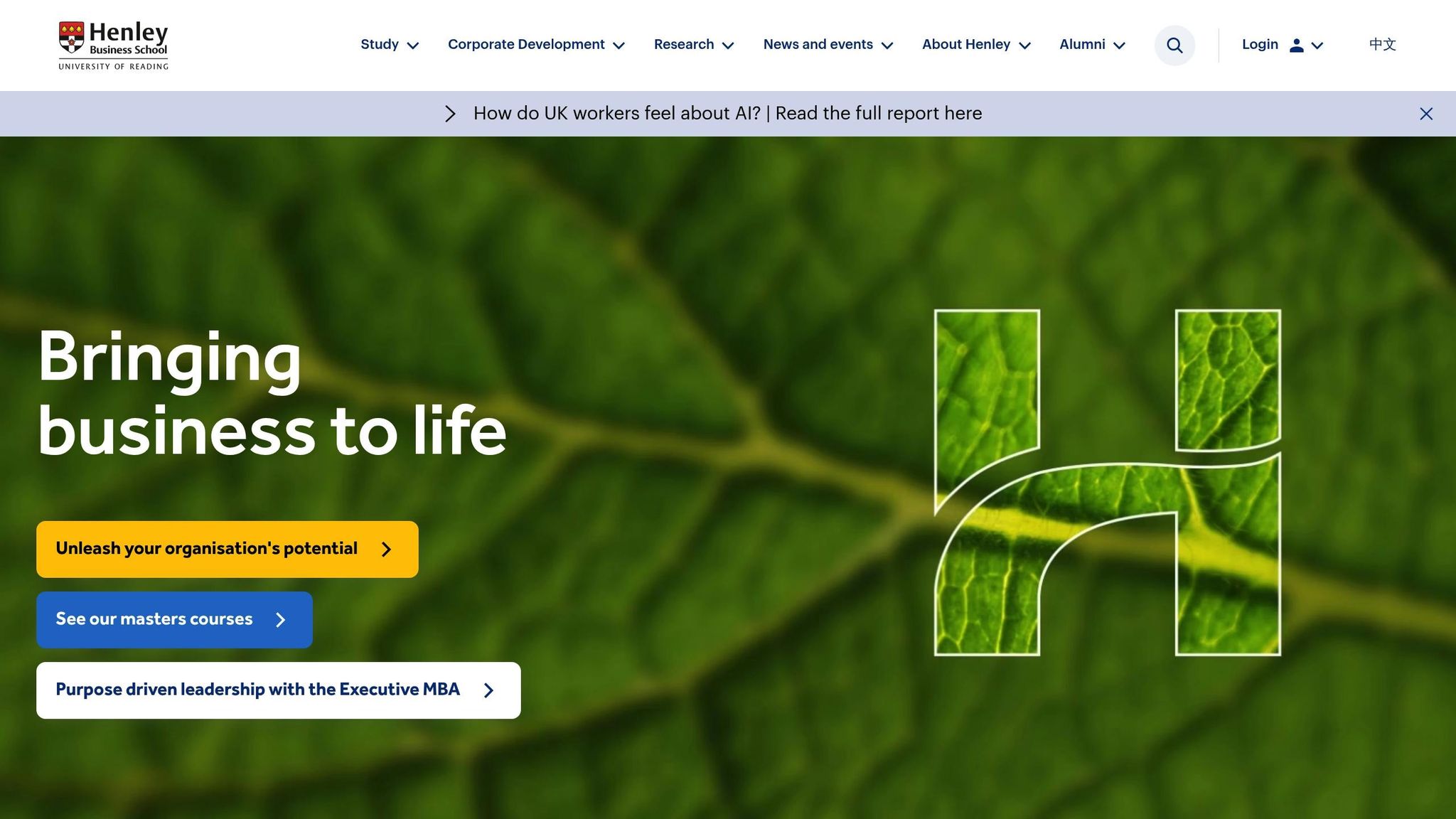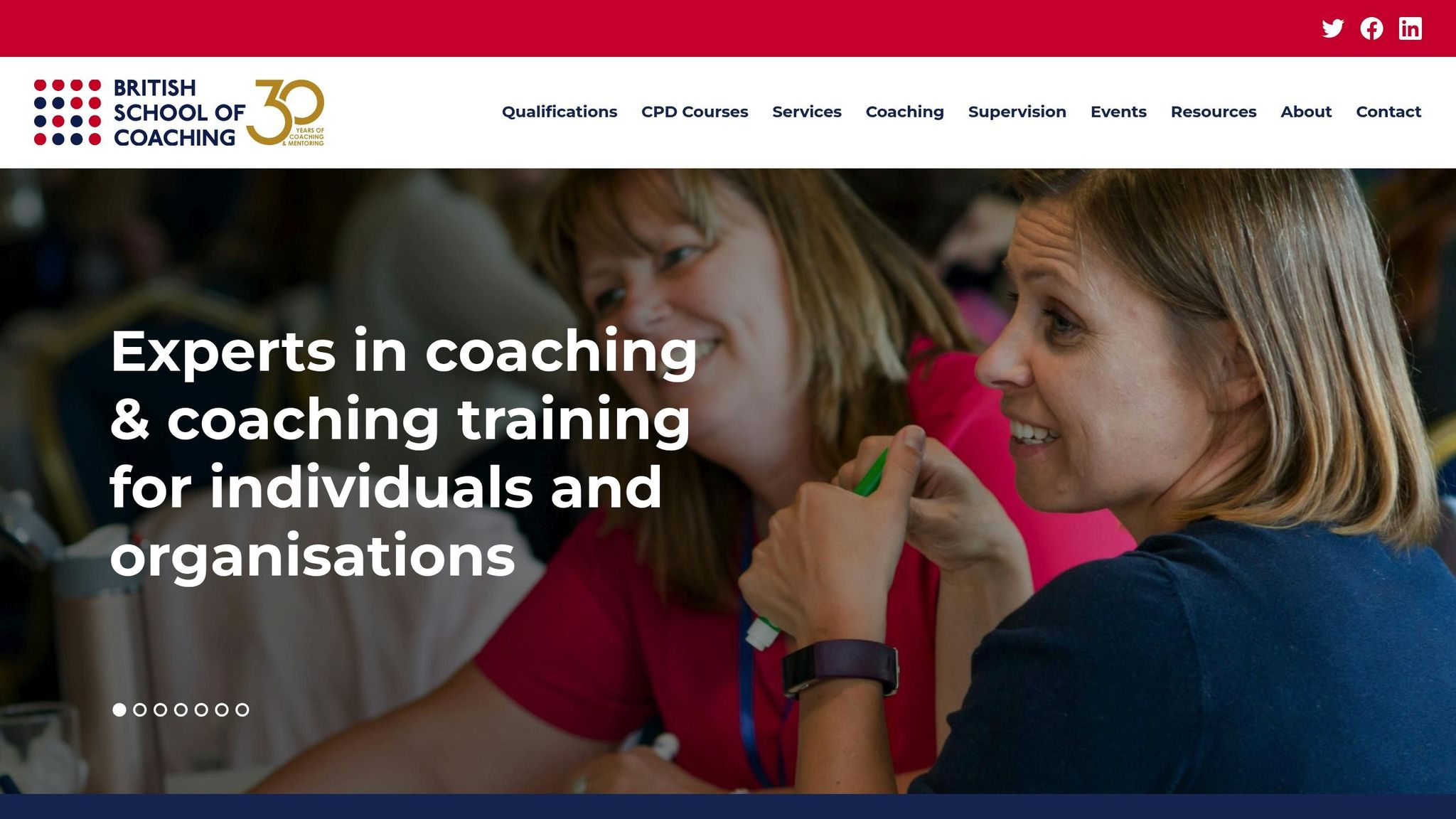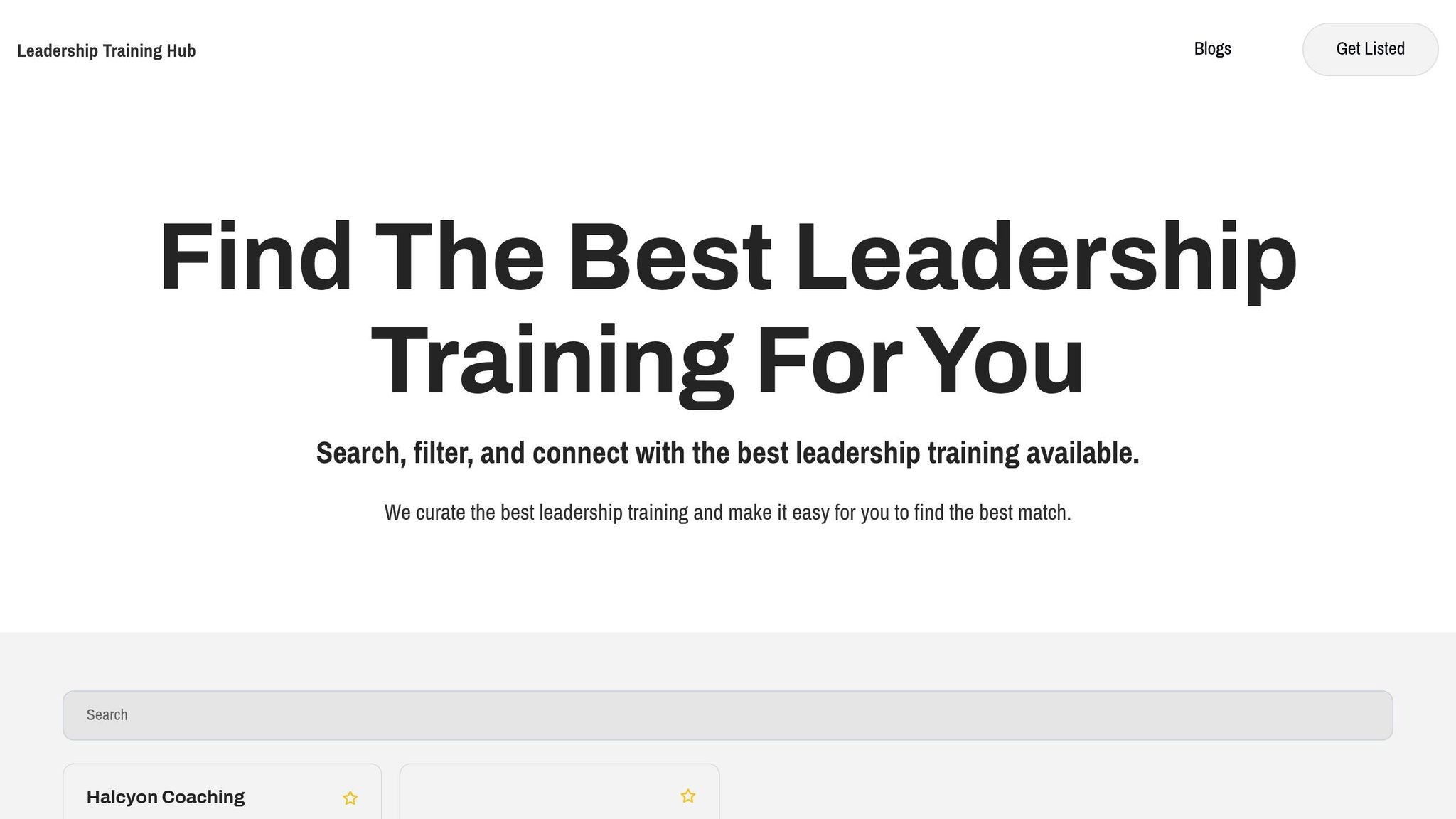Typical leadership training costs vary widely in the UK. View typical leadership training costs in the UK.
Looking for the best executive coaching programmes in the UK? Here’s a quick guide to help you decide.
Executive coaching is a growing industry, with companies reporting an average ROI of 788%. Costs range widely, from £150 per hour to £24,000 for intensive programmes. This guide highlights five top programmes, comparing their pricing, features, and target audiences.
Key Programmes:
- Henley Business School (£7,250): Nine-month part-time programme with triple accreditation (ICF, AC, EMCC). Ideal for both new and experienced coaches.
- British School of Coaching (£4,790): ILM Level 7 Diploma focused on senior professionals, with 12 months of online or hybrid learning.
- AoEC Practitioner Diploma (varies): Flexible formats with triple accreditation, suited for managers and HR professionals.
- ILM Level 5 Certificate (£1,695–£2,395): A budget-friendly option for middle managers and HR professionals, offering flexible schedules.
- Leadership Training Hub Directory (£299): A range of programmes for all levels, including high-potential leadership trainers.
Quick Comparison:
| Programme | Cost (£) | Duration | Accreditation | Target Audience | Delivery Format |
|---|---|---|---|---|---|
| Henley Business School | 7,250 | 9 months | ICF, AC, EMCC | Beginners to experienced coaches | In-person & live-online |
| British School of Coaching | 4,790 | 12 months | ILM, City & Guilds | Senior professionals | Online & hybrid |
| AoEC Practitioner Diploma | Varies | Flexible | ICF, AC, EMCC | Managers, HR, leaders | Virtual & in-person options |
| ILM Level 5 Certificate | 1,695–2,395 | 12 months | ILM | Middle managers, HR, leaders | Blended & flexible |
| Leadership Training Hub | 299–40,300 | Varies | Varies | All levels | Online & in-person options |
Tip: Choose based on your goals, budget, and the programme's alignment with your professional needs. For senior executives, Henley offers prestige and depth. For cost-conscious learners, ILM Level 5 is a solid choice.
What Accreditation Body Do I Choose?
1. Henley Business School: Professional Certificate in Executive Coaching

Henley Business School is widely regarded as a top institution for executive coaching education, combining academic depth with hands-on experience. According to the Financial Times 2025 rankings, it ranks 4th in the UK and 25th globally for executive education open programmes.
Cost (£)
This programme is priced at £7,250 (VAT exempt), applicable to both live-online and in-person formats. However, accommodation costs are not included for those attending in-person sessions. When compared to individual executive coaching sessions, which can cost up to £2,000 per hour, this fee represents a considerable investment in professional development.
Accreditation
The course holds triple accreditation, recognised by the International Coaching Federation (ICF) at Level 1, the Association for Coaching (AC), and the European Mentoring & Coaching Council (EMCC) at Senior Practitioner level. Graduates complete 71 hours of approved coaching training, 10 hours of coach mentoring, and 4 hours of group coaching supervision. This not only meets the requirements for individual coach accreditation with these bodies but also provides a strong foundation for building professional credentials.
Duration and Delivery
The programme is designed to fit around a busy professional schedule, running part-time over nine months. Before starting, participants are required to complete 2–3 hours of preparatory work, including background reading and self-reflection exercises, to ensure they are ready to dive into the course.
Henley offers two flexible delivery options. The in-person format includes full-day workshops at the Greenlands campus (and select international campuses), combined with virtual study, mentoring, and supervision. The live-online format mirrors this structure, maintaining the same level of interaction and support. Both formats offer weekday and weekend intakes, and full attendance at all sessions is mandatory for successful completion.
Target Audience and Key Features
This programme is suitable for a broad range of participants, from those new to coaching to experienced practitioners seeking formal accreditation. A key highlight is the requirement to complete at least 20 hours of coaching practice outside the structured workshops and online sessions, giving participants valuable real-world experience. Additionally, the Henley Centre for Coaching is globally recognised for its expertise in coaching research and training, further enhancing the value of this qualification.
2. British School of Coaching: ILM Level 7 Executive Coaching and Mentoring

The British School of Coaching (BSC) provides a postgraduate qualification tailored for senior professionals aiming to refine their executive coaching expertise. Recognised with Direct Claim Status from ILM, this programme stands out as a respected choice for those looking to advance their coaching careers.
Cost (£)
The ILM Level 7 Executive Coaching Diploma is priced at £4,790 for the online option.
Accreditation
This programme is accredited by ILM and City & Guilds, culminating in an internationally recognised ILM Level 7 Certificate upon successful completion. This accreditation adds professional weight to participants' credentials in the UK's executive coaching field. Graduates also earn 14 credits on the international qualifications framework, further solidifying their professional standing.
Duration and Delivery Format
The course spans approximately 12 months. It includes six live workshop days, focusing on practical exercises and peer collaboration. These sessions are delivered online or through a hybrid format, offering flexibility. Participants receive extensive tutor and mentor support, including feedback on assignments and supervision of coaching sessions. The course package includes essential materials such as programme folders, handbooks, workbooks, and access to a variety of coaching resources.
Target Audience
This qualification is designed for senior professionals, including leaders, senior managers, headteachers, and HR/OD practitioners. It's ideal for those looking to lead coaching initiatives within their organisations or establish themselves as freelance coaches. Applicants should have experience in strategic leadership and access to senior-level clients for their coaching practice.
Key Features
The programme incorporates 20 hours of coaching practice, ensuring participants gain hands-on experience. Assessment is divided into three parts: a theoretical assignment, a portfolio, and a reflective journal, offering a thorough evaluation of skills and knowledge.
"I was impressed with the thoroughly professional approach of the course tutor(s) enabling me to understand at a deeper level the principles involved in successful coaching. The course was good mixture of practical and theory and was enjoyable and informative. It also challenged me to think of how I can use my new skills at executive and strategic level which I will certainly do."
– Headteacher, Primary School
The programme’s focus on strategic coaching is a key highlight. In fact, 89% of CMI graduates reported applying the skills gained from their qualification in their current roles, and 88% noted that it improved their career prospects.
Kawther Alhamed, Head of HR at the Prime Minister's Office in the UAE, underscored the programme’s international appeal, sharing her experience: "I felt privileged to be one of the first UAE nationals to ever participate in the ILM Level 7 Certificate in Executive Coaching and Mentoring".
3. Practitioner Diploma in Executive Coaching
The AoEC Practitioner Diploma stands out as a hands-on, flexible programme tailored for those looking to deepen their expertise in executive coaching, whether they are seasoned professionals or just starting to build a portfolio career in this field.
Cost (£)
The cost of the programme depends on the delivery format and location. For in-person sessions, the fees cover study materials, refreshments, and lunch, while virtual options exclude these extras. Self-funders can take advantage of interest-free payment plans to make the programme more accessible.
Accreditation
This diploma is triple accredited by the Association for Coaching (AC), EMCC Global, and the International Coaching Federation (ICF). It provides 64 hours of coach-specific training, meeting the requirements for ICF Associate Certified Coach credentials. It also supports EMCC Global Individual Accreditation and offers pathways to further certifications such as the Foundation Executive Coach certification and AC Accelerated Accreditation.
Duration and Delivery Format
The programme combines live modules, e-learning components, mentor coaching sessions, and a final assessment day. Participants can choose from a variety of formats, including virtual sessions, face-to-face weekend modules, or customised in-house options.
Target Audience
This diploma is designed for a diverse group, including managers, HR professionals, talent development specialists, and leaders like CEOs, educators, and military personnel. It’s perfect for anyone aiming to refine their coaching abilities and make a greater impact in their roles.
Key Features
The programme focuses on enhancing self-awareness, breaking through personal barriers, and improving strategic communication. These skills are aimed at helping participants engage and inspire their teams more effectively, while also supporting areas like succession planning, talent development, and fostering accountability within organisations.
sbb-itb-fa39ac2
4. ILM Level 5 Certificate in Effective Coaching and Mentoring
The ILM Level 5 Certificate in Effective Coaching and Mentoring is a standout choice for professionals looking to strengthen their leadership and coaching capabilities. It serves as a bridge between informal coaching practices and formal professional qualifications, offering a practical and flexible option for those balancing work commitments with personal development.
Cost (£)
The cost of the ILM Level 5 Certificate varies depending on the provider, making it accessible to a range of budgets. For instance:
- University of South Wales: £1,695, which includes all course materials and registration fees.
- University of Strathclyde: £1,800, with an early bird discount reducing the fee to £1,500 for early bookings.
- UWE Bristol: £2,150, with an early bird discount lowering the cost to £1,935. Additional concessions are available for alumni, staff, and course connect partners.
- UKCPD: £2,395.
- IG Company: Offers a Level 5 Diploma variant for £4,500.
- Southern Regional College: Provides the programme for free through its Skill Up funding initiative.
For self-funding professionals, many providers also offer payment plans, easing the financial commitment.
Accreditation
This qualification is accredited by the ILM (Institute of Leadership and Management), a globally recognised body backed by City & Guilds. It holds 16 credits on the international qualifications framework, equating to the second year of an undergraduate degree or higher education diploma.
The programme's value is reinforced by its impact on businesses: 93% of companies report improved managerial performance after employees complete ILM courses, and 78% see a strong return on investment within a year. Such credentials not only enhance professional credibility but also provide practical and academic grounding for career advancement.
Duration and Delivery Format
The programme is structured to accommodate the busy schedules of working professionals. It includes 18 hours of coaching practice, which strikes a balance between hands-on experience and manageable time commitments compared to more intensive diploma-level courses.
Delivery methods vary by provider but often include interactive workshops, mentor support, and flexible learning options. For example, the British School of Coaching offers a year-long programme, allowing participants to build skills gradually while continuing their professional roles. Many providers also offer blended learning formats, combining in-person workshops with online sessions, or weekend classes for added convenience.
Target Audience
This qualification is tailored for middle managers, HR or organisational development professionals, and operational leaders. It’s particularly useful for those with significant coaching and mentoring responsibilities or those looking to transition into development-focused roles. Aspiring freelance coaches and mentors also benefit, as the course provides a solid foundation for building credibility and establishing a client base.
With over 77% of employers identifying major gaps in leadership skills, this programme addresses a pressing need, equipping participants with the tools to fill those gaps effectively.
Key Features
The ILM Level 5 Certificate focuses on developing practical coaching skills and fostering meaningful professional relationships within organisations. Instead of relying on rigid, formulaic methods, the course encourages participants to think critically and engage managers in deeper, more complex discussions.
Key learning outcomes include:
- Understanding core principles of coaching and mentoring.
- Applying coaching techniques across diverse scenarios.
- Assessing the effectiveness of coaching interventions.
Participants also gain access to extensive coaching resources and continuous tutor support throughout their studies. Graduates can join approved coach lists, turning informal coaching abilities into recognised professional qualifications. This practical, flexible approach ensures participants acquire skills they can apply immediately, without the need for extended academic courses.
5. Leadership Training Hub Directory Programmes

Expanding on the earlier exploration of individual coaching options, this directory pulls together a variety of programmes designed to meet diverse organisational needs. Leadership Training Hub serves as a bridge, connecting professionals to an array of executive coaching and leadership development opportunities from different providers.
Cost (£)
The programmes listed in the directory span a wide range of price points, ensuring organisations of all sizes and budgets can find a suitable option. For example, the London Business School's Senior Executive Programme costs £40,300, while their online courses start at £1,995.
The AoC's Senior Leadership Development Programme is priced at £3,885 + VAT for member colleges and £4,485 + VAT for non-members for the Autumn/Winter 2025 intake. These prices increase slightly to £3,945 + VAT for members in Spring/Summer 2026. Additionally, individual face-to-face modules are available starting at £1,295 + VAT for members.
The Happy Leadership Programme offers tiered pricing to accommodate different types of organisations:
- Standard organisations: £3,240 (excl. VAT)
- SMEs (fewer than 250 staff): £2,700
- Public sector organisations: £1,980
- Large charities (31+ staff): £1,740
- Small charities (fewer than 30 staff): £1,500.
Target Audience
These programmes are designed to support a wide range of professionals, breaking the traditional perception that executive coaching is just for top-level executives. Increasingly, these opportunities are being extended to high-potential employees at all levels of an organisation. Whether you're an emerging leader or an experienced executive, there’s likely a programme tailored to your needs. Notably, research shows that 77% of executives who worked with a coach reported improvements in at least one of nine business areas, with productivity and employee satisfaction being the most impacted.
Key Features
What sets this directory apart is its broad and detailed coverage of leadership development areas. Programmes tackle essential topics like change management, communication, and teamwork while incorporating blended learning formats. They also place a strong emphasis on self-awareness, emotional intelligence, and influencing skills.
Providers are increasingly offering customised approaches that align with an organisation’s unique culture and strategic goals. These tailored methods aim to strengthen core leadership skills while addressing specific business needs.
Accreditation
Many programmes in the directory come with accreditations from respected organisations like the ICF or EMCC, ensuring participants earn qualifications that boost their professional standing.
Duration and Delivery Format
The directory highlights flexible programme structures that cater to the busy schedules of working professionals. Blended delivery methods are a common feature, combining in-person workshops with online sessions. This ensures meaningful interaction while accommodating modern learning preferences.
The results speak for themselves: executive coaching has been shown to improve individual performance by up to 70%, while team performance can see a boost of 50%. This flexibility and measurable impact underline the value of these programmes in supporting effective leadership development strategies.
Advantages and Disadvantages
When considering executive coaching programmes, it's important to weigh their benefits and challenges. Research shows that coaching delivers impressive results, with 96% of participants stating they would choose to undergo the process again.
Here’s a breakdown of some popular coaching programmes, highlighting their strengths and potential drawbacks:
| Programme | Key Advantages | Main Disadvantages |
|---|---|---|
| Henley Business School | Backed by a prestigious university, offers a comprehensive curriculum, and excellent networking opportunities | High cost, significant time commitment, and limited flexibility |
| British School of Coaching | ILM Level 7 accreditation, practical focus, and strong reputation | Requires substantial prior experience, and its structured approach may not suit everyone |
| Practitioner Diploma | Emphasises hands-on learning, allows immediate application, and offers flexible scheduling | Quality varies between providers, and content is less standardised |
| ILM Level 5 Certificate | Recognised qualification, accessible entry requirements, and budget-friendly | Limited depth for senior executives due to its lower certification level |
| Leadership Training Hub Directory | Offers a wide range of options, flexible pricing, and customisable solutions | Quality depends on the provider, requiring careful evaluation |
These considerations build on earlier discussions about programme features and their potential to drive measurable improvements in performance.
On the financial front, coaching often proves its worth. For instance, a Fortune 1000 company reported an average ROI nearly six times the cost of coaching. Additionally, 86% of organisations reported a positive ROI from their coaching initiatives.
However, challenges persist. High costs can be a barrier, particularly for smaller organisations, and success hinges on the active participation of coachees. Misaligned expectations between coach and participant can also lead to less predictable outcomes. The lack of standardisation across the industry further complicates comparisons between programmes.
Statistics show that training alone can boost productivity by 22%, but when combined with coaching, this figure jumps to 88%. This highlights the added value of integrating coaching with traditional training methods.
In the UK, 84% of organisations invest in leadership development, with executive coaching playing a key role. This widespread adoption demonstrates its perceived value, though organisations must carefully assess programmes to find the best match for their needs.
As Dr Martin Goldsmith, an International Executive Coach & Author, puts it: "What got you where you currently are, won't get you where you want to go...". His insight underscores the transformative potential of coaching, while reminding us that real growth requires genuine effort and commitment.
Ultimately, aligning a programme's features with organisational goals, budget, and participant readiness is critical. With 93% of organisations reporting improved leadership effectiveness, choosing the right coaching programme can make all the difference.
Final Recommendations
Selecting the right executive coaching programme hinges on your specific objectives, budget, and organisational needs. Here’s how to make an informed choice.
For seasoned executives, Henley Business School's Programme stands out, offering in-depth development opportunities. While the fee is £7,250, the school’s reputation and networking benefits often justify the cost. Many organisations report a return of 5.7 times their investment in executive coaching, highlighting its potential value.
For organisations mindful of costs, the ILM Level 5 Certificate provides a strong foundation in coaching skills at a more affordable price. Data shows that training alone can boost productivity by 22%, but combining training with coaching raises that figure to 88%. This makes quality coaching a worthwhile investment for long-term gains.
If you’re exploring a broader range of options, the Leadership Training Hub Directory is worth considering. It offers programmes priced between £299 and £2,999, making it an excellent choice for pilot initiatives where careful planning and budget management are key.
Industry-specific challenges should also shape your decision. Research suggests that a coach’s experience, recommendations, and track record often outweigh formal qualifications when choosing an executive coach. If your sector faces unique obstacles, look for programmes that offer expertise tailored to your industry.
Measuring outcomes is another critical factor. For instance, one professional services firm invested £75,000 in a six-month coaching programme and saw a 580% return on investment within a year. The initiative improved director retention by 20%, saving around £210,000 in replacement costs, and increased team engagement scores by 24%.
Budget allocation plays a significant role in leadership development. Many organisations set aside £1,000 to £4,000 per leader annually for these programmes. As Dave Zerfoss, CEO, aptly noted:
"If you don't have a line item in your budget for leadership training, you're not taking leadership development seriously".
Starting with pilot programmes can help you test the waters before scaling up. Building a team of internal coaches is a cost-efficient approach, which can be complemented by external programmes for senior leaders.
The numbers don’t lie: 87% of executives report a high return on investment from coaching, and 86% of companies recover their coaching expenditures. Focus on programmes with practical applications and measurable results, ensuring they align with your organisation’s goals. This alignment is key to unlocking the strategic benefits of executive coaching.
FAQs
How can I choose the right executive coaching programme for my career goals and budget?
To choose the right executive coaching programme, start by pinpointing your career goals and the areas where you'd like to grow. Are you aiming to enhance your leadership abilities, boost your performance, or develop entirely new skills? Having a clear focus will make it easier to assess your options.
In the UK, coaching programmes can cost anywhere from a few hundred to several thousand pounds. Prices vary depending on factors like the provider, the programme's length, and the services included. To determine if a programme is worth the investment, think about how its outcomes align with your career goals and the potential impact on your professional growth. Look for options that provide tangible results and cater specifically to your leadership development needs.
What are the key advantages of enrolling in a triple-accredited programme, and how can it enhance my professional standing?
Enrolling in a triple-accredited programme comes with some impressive advantages. It guarantees top-tier academic standards, global recognition, and a reputation that can boost both your professional credibility and career prospects.
Employers, especially those in international markets, place a high value on these programmes. They signal a dedication to quality and leadership growth, making you a more attractive candidate for roles with prestigious organisations across the globe.
In short, a triple-accredited programme connects you to a globally respected benchmark, enhancing your credentials and helping you make a mark in competitive job markets.
Do executive coaching programmes deliver measurable value, and how can their success be evaluated within an organisation?
Executive coaching programmes have the potential to bring meaningful benefits, often offering a strong return on investment (ROI). Studies indicate that organisations see improvements in leadership abilities, employee engagement, and overall productivity as direct outcomes of coaching.
To gauge the success of these programmes, it’s essential to focus on key performance indicators (KPIs) like leadership effectiveness, team performance, and employee retention. Tracking progress against the specific goals established during the coaching process is equally important. Additionally, monitoring changes in workplace morale and well-being can offer valuable insights into the programme’s influence. Together, these metrics paint a clear picture of how coaching contributes to your organisation’s success.


